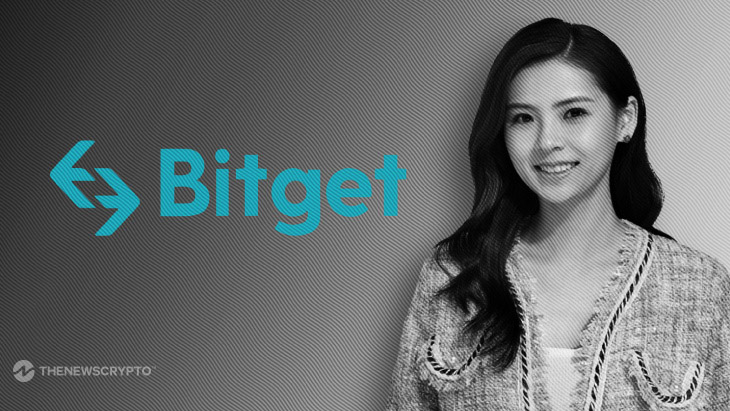Bitget’s managing director Gracy Chen joined an exclusive interview with TheNewsCrypto to crucially talk about the future of crypto exchanges in the evolving regulatory landscape and also the role of Bitget exchange in the sector. Gracy Chen is a renowned “Global Shaper”, as acknowledged by the World Economic Forum in 2015.
Bitget is a centralized exchange with more than 8 million users from over 100 countries, with over 100,000 traders. At present it is in the top five in derivative crypto exchange among all the centralized exchanges and the top ten among spot markets.
TheNewsCrypto: Why did Bitget highly focus on covering the derivatives market?
Gracy Chen: One of the reasons is that the company started off in the bear market in 2018. Usually, during the bear market, derivatives are more traded than just the normal spot market in terms of buy and sell options. Another reason is we set out mainly in East Asia and the users of the region majorly prefer derivatives. But that said doesn’t mean we want to just focus on the derivative market as we acknowledge the differences in user behavior in both markets. Moreover, the majority of crypto users still opt for the spot market because of more leverage. But the majority, especially when we see cryptocurrencies going to the mainstream, the main users we are attracting as an industry are still spot market users. So since late 2021, we started to tackle the spot market more to attract these traders.
According to the statistics on CoinGecko (at the time of the interview), Bitget holds a trading volume of $598 million in the spot market and $7.5 billion in the derivative market.
TheNewsCrypto: Where do you see the future of trading with respect to the emergence of different upgraded technologies such as AI or automated bots?
Gracy Chen: Well, I think AI and automated bot trading are the future. I still doubt how much or how soon it can be. Right now, AI has become a popular topic, especially after ChatGPT’s viral arrival. Many people have started using AI-powered trading and its implementation on Bitget is at the nascent stage. It has got good advantages. Firstly, the AI-enabled prompts and problem-solving tools bolster the accuracy and efficiency of trading and also enhance the user experience. Secondly, some strategies are proven to be way more intelligent than other modes.
But on the flip side, risks and shortcomings do appear. AI-driven trading platforms relying on a large amount of historical data to develop and optimize trading strategies pull up the main risk. Things could go wrong if the data used are too historical with minimal integration of real-time market information. These AI tools or bots can generate better strategies for high-yielding trades if a balance between the usage of historical data and real-time data is maintained.
TheNewsCrypto: The collapse of high-profile exchanges like FTX has spurred the tension between CeFi and DeFi ecosystems. How does Bitget tackle these issues and ensure it stays well-capitalized?
Gracy Chen: Bitget is a centralized crypto exchange. But we focus on diversifying our ecosystem beyond centralized finance (CeFi). Significantly, as announced during the Paris Blockchain Week, we acquired BitKeep, a decentralized wallet, and become its major stakeholder. Through this, we step into decentralized finance (DeFi). DeFi requires greater support from crypto entities for further development and expansion. Because users’ trust in centralized entities has begun diminishing after the FTX collapse.
To ensure we are well-capitalized, Bitget’s ecosystem is backed up by a primary market venture and also a secondary market investment. We also own a fund of funds (FoF) in other ventures and have invested $400 million in it. Moreover, Bitget has secured $10 million in funding from Dragonfly, a prominent crypto-focused venture capital firm. In addition to this, we also have a crypto media called Foresight News.
TheNewsCrypto: What does an exchange-friendly regulation look like?
Gracy Chen: It would, first of all, involve much more conversations between not just exchanges but also with the regulators, industrialists, and Web 3 projects and even other third-party providers. Crucially, these are on and off with the regulators. But at least we see, for example, the Hong Kong government is doing that. We’ve been having lots of conversations with them, with the key decision-makers. Yeah. So I think that’s one way of looking at it. I hope regulation will soon be more welcoming to exchanges.
Another thing, it’s important for exchanges to adopt a self-regulatory or self-proving framework, especially before the crypto regulation actually comes into the picture. We have our proof-of-reserve published, many other exchanges are doing the same. We also have a protection fund that’s the second largest protection fund – $300 million — after Binance in the industry to protect our user’s funds. The exchange maintains this fund as an open, publicly visible wallet.
TheNewsCrypto: In the global regulatory landscape, Hong Kong has begun garnering greater attention. What is Bitget’s stance in approaching these crypto-active jurisdictions?
Gracy Chen: Bitget is actively seeking a license to operate in Hong Kong. We are optimistic that East Asia will continue to see user growth in terms of volume and activity. On top of it, Bitget recently announced a USD 100 million Web3 fund. Through this, we will attract other entities that align with the exchange’s core mission.








